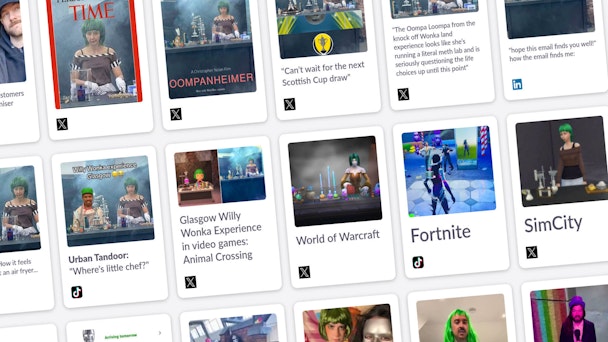Tik-Talks: Why Willy Wonka has given Elon reasons to be cheerful, post-by-post
As the cocoa powder settles on the Willy Wonka Experience, Tik-Talks analyzes how the social media activity around the grim and sparsely decorated warehouse in Glasgow combined to make it a global sensation and how Willy Wonka could be the savior of Elon Musk’s beleaguered platform, X.

Willy Wonka Experience mentions collated on Shooglebox
In this new regular series, Tik-Talks, The Drum is partnering up with online social media insight and trend-spotting platform Shooglebox to dip into its ‘Buzz’ social monitoring service, which helps brands spot, understand and quickly act on emerging TikTok trends. Used by marketing and PR teams, Buzz enables brands to tap into what customers are seeing, saying, and doing on social and Tik-Talks will use Buzz from Shooglebox to analyze social activity around global stories and events to predict important consumer trends and help marketers make better decisions to drive their marketing activity.
And where else could Tik-Talks start but by bringing into a single platform all of the key social media activity that made the Willy Wonka Experience disaster masterminded by Scottish ‘entrepreneur’ Billy Coull become an overnight global smash hit, for all the wrong reasons?
The infamous Willy Wonka Experience was the gift that kept on giving across all social channels as the fast-moving reaction to it unleashed a wave of creativity and highly amusing content across TikTok, X/Twitter, Facebook, Instagram, LinkedIn and other platforms. Combined, the activity took the Willy Wonka Experience from a small provincial event to an overnight global sensation.
The global mainstream broadcast and press media simply couldn’t get enough of the story, but it was predominantly across the different social platforms that it all played out – from the initial grainy photos and shaky handheld iPhone videos posted by disappointed customers to the flood of amusing memes and parodies that followed.
Add to that the revelations in TikToks uploaded by some of the unfortunate actors involved in the event itself and it turned into an absolute festival of creativity. Perhaps Apple should consider adding it to its ongoing ‘Shot on iPhone’ campaign.
In fact, since the debacle, a number of the actors involved – the lady Oompa Loompa and Willy himself were first – have taken full advantage and are now offering Cameos for cash to those people enamored with these unlikely global superstars.
The fragmentation of social media in recent years means that many of the biggest trends and topics are often confined to different people’s networks of choice – with little crossover between what people are getting excited about on TikTok, X and the Meta platforms. Glasgow’s Willy Wonka Experience was one of those that genuinely united social media and, in particular, X/Twitter.
While Billy Coull and his House of Illuminati were the biggest losers in the story, X/Twitter was probably the biggest winner.
The platform has been losing users hand over fist since Elon Musk acquired the platform, changed the name and instigated several measures that, while designed to build the platform into a Western version of China’s WeChat, have only served to direct users toward other platforms, particularly TikTok.
But the rapidity at which memes and social content were being created around the Willy Wonka Experience played into X’s hands as people remembered that the platform remains the fastest way to share image and video content to larger networks of followers before Elon did his best to destroy them.
One reporter at The Drum, who shall remain nameless, was heard to say: “It’s things like Willy Wonka that make you realize just how good Twitter is at this stuff.” High praise indeed.
Photo of the Year contender
One of the most widely shared photographs – the one of the glum-looking female Oompa Loompa in what looked to be a disorganized meth lab – was hailed as “single-handedly the photo of the year” in one tweet that racked up 8m views alone. It was also quickly leaped upon on by wits and meme makers and even big brands got in on that act.
Famous for having a sense of humor, Aldi and Domino’s shared content connected to the fiasco, clearly clicking into the zeitgeist and seeing it as an opportunity to have some fun at Willy’s expense.
When actor Kirsty Paterson revealed herself as the Oompa Loompa girl in a TikTok it gave fresh impetus to the memes as she was described as a “good sport.” She quickly set up a Cameo account offering personal video messages dressed as the “weegie Oompa Loompa girl.”
Posts comparing images of the promised AI-created Willy Wonka world with the bleak reality that was delivered went instantly viral and inspired similar comparisons – mental health charity Mind using it to illustrate quite a serious political point with its “the mental health support the government keeps promising” while Funky Pigeon used it to have a dig rival card company Moonpig.
The made-up character ‘The Unknown’ – an evil chocolate maker who hides in a wall behind a mirror and jumps out to terrify children – was quickly turned into a CapCut template for TikTok creators.
Derbyshire Police won kudos for using it in a TikTok: “NAHHHH THIS IS GOLD,” “Nah not Derbyshire police getting involved with the unknown memes, 2024 is everything I hoped for and more.”
The bleakness of the £35 experience – with kids getting a quarter of a can of lemonade and a couple of jelly beans – was social comedy gold dust: the huge Lego fan community, Beyond the Brick, posted a picture of a spoof Lego City kit Willy’s World of Sadness, people shared clips of uncannily similar events in SpongeBob SquarePants and The Simpsons, while Glasgow cocktail bar The Spiritualist posted a pic of a new special, A World of Disappointment: a double shot of lemonade garnished with a delicious jelly bean. Other popular memes included the “missing” Kate Middleton and other celebs visiting the attraction.
So, what have we learned from Willy Wonka?
Mainstream media and brands were very quick to get involved and post on social media, but the most watched and most liked posts were those by people directly involved – Willy Wonka Experience customers and performers – and regular X and TikTok users with a funny or eye-catching take on the phenomenon.
You don’t need lots of followers on TikTok to be noticed by millions of people if your content hits the mark. A social media phenomenon like the Glasgow Willy Wonka Experience just shows again the declining influence of mainstream media and their dependence on social to find the things that are getting people talking and excited.
Brands that moved fast – like Funky Pigeon on TikTok and Domino’s and Aldi on Facebook – received a warm response, perhaps helped by a core audience who appreciate the brands’ senses of humor. The fact these brands use humor in their ads means consumers are ready for it when it hits in instances like this and love to share it.
Reaction to brands posting four or five days later was a little more cynical – “Nothing kills a joke faster than corporate getting involved.” After the Labour Party tweeted a ‘promise v reality’ meme on Budget Day, television’s ‘Have I Got News For You’ account posted: “The country is in mourning today after the death of the popular Willy Wonka Experience meme that was brutally murdered yesterday by the Labour Party.”
As mentioned, jaded X users celebrated the way the Wonka Experience had brought fun and laughter back to Elon Musk’s platform, just like the old days: “Twitter is BACK”.
X has tried to emulate TikTok’s algorithmically recommendation-driven ‘For You’ page, but users say it has resulted in them being pushed annoying or controversial content designed to get an emotional reaction. One X user tweeted: “Continuously scrolling through the most bizarre and hilarious tweets about Kate Middleton and the Glasgow Willy Wonka experience, realizing we’ve given this app new life again.”
Recent TikTok trends like “You have been promoted” and “I wouldn’t tell anyone if I won the lottery, but there’d be signs” transitioned over to X in Wonka memes, bringing more TikTok-inspired fun to the Musk platform.
More serious takes on the Glasgow Experience were posted on X and, as you may expect, on LinkedIn. The danger of using AI in promo material and the damage it had done to the reputation of immersive experiences, but these got very little interest compared with the desire to treat the whole thing as a source of fun and light relief, like the Change.org petition demanding: Reopen the Beloved Glasgow Willy Wonka Experience, with 7,000 signatures. Did you sign?
